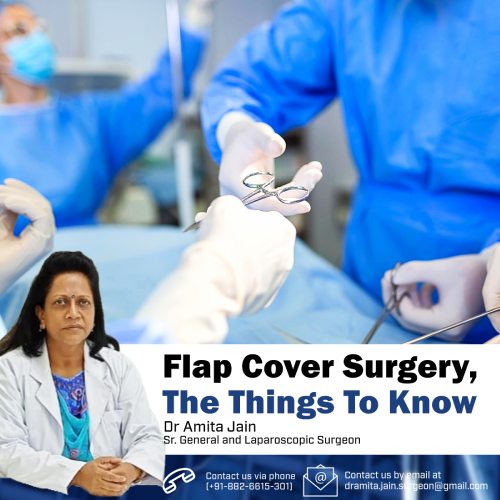Shares India’s Leading Laparoscopic Surgeon Surgeon Dr Amita Jain
In the world of advanced medical procedures, flap cover surgery emerges as a critical technique, offering remarkable solutions for a range of complex health challenges. This intricate procedure involves the transplantation of tissue from one area of the body to another, functioning as a cover to restore damaged skin, enhance healing, and improve the overall quality of life for patients. This article from Dr Amita Jain shares insights on flap cover surgery.

What is flap cover surgery?
Dr. Jain shares the following things to understand it in a better way, they are:
Understanding Flap Cover Surgery:
Flap cover surgery finds its significance in cases where skin or tissue loss due to traumatic injuries, burns, chronic wounds, or surgical procedures requires comprehensive reconstruction. Unlike conventional wound treatment methods, flap cover surgery provides a tailored approach to healing, ensuring not only the physical restoration but also the functional rehabilitation of the affected area.
The Surgical Process:
Flap cover surgery is a meticulous process that demands surgical expertise and attention to detail. The procedure involves transferring tissue, often including skin, fat, muscle, and blood vessels, from a healthy donor site to the area in need of repair. The selected donor tissue, or flap, is chosen based on its compatibility with the recipient site’s requirements.

What are the types of flap cover surgery?
There are certain types that can be done for a flap cover surgery they are:
Types of Flap Cover Surgery:
- Local Flaps: These involve using nearby tissue to cover the wound or affected area. Local flaps are suitable for smaller defects, providing effective coverage and healing.
- Regional Flaps: These flaps utilize tissue from a neighboring region that shares a similar blood supply with the recipient site. The vascular connection enhances the success of the procedure and makes it suitable for larger defects.
- Free Flaps: This complex technique involves detaching tissue, along with its blood supply, from the donor site and reattaching it to the recipient site’s blood vessels. Free flaps are particularly effective for intricate reconstructions.
Preparation and Preoperative Tests:
Before flap cover surgery, a thorough assessment is conducted to ensure the patient’s candidacy for the procedure. This includes a comprehensive medical history review, physical examinations, and diagnostic imaging such as MRI, CT scans, or ultrasound. These tests help evaluate the extent of tissue loss and assess the blood supply to the recipient area.
Furthermore, blood tests and other laboratory analyses are performed to evaluate the patient’s overall health and identify potential risks or complications during and after the surgery.
Psychological readiness is also vital, as flap cover surgery may require post-operative care and adjustments. Establishing clear communication between the medical team and the patient aids in managing expectations and addressing any concerns.
In a nutshell, flap cover surgery stands as a testament to the remarkable strides made in medical science. It offers a lifeline to individuals grappling with extensive tissue loss, promising a chance at renewed health and confidence.
With various types of flap procedures available, each tailored to the patient’s unique needs, this surgical approach exemplifies the intricate nature of the human body and the expertise of medical professionals. The battery of tests and preparatory measures underscores the commitment to ensuring a successful outcome. As medical knowledge continues to evolve, flap cover surgery remains a beacon of hope, embodying the resilience of the human spirit and the power of medical innovation.

Dr Amita Jain is a surgeon with the highest degree of professional competence, precision and surgical craftsmanship. Performed all complicated general surgery procedures with in depth knowledge of invasive and few minimal invasive and onco surgical techniques. Underwent special training in trauma, executed various trauma-related complex life-saving neurosurgical procedures, reconstructed injured mangled limbs and performed vascular and reconstructive procedures with critical care.
Dr Amita Jain holds 28 plus years of rich experience in Trauma and General Laparoscopic Surgeries (including Gallbladder stone removal, appendix removal, hernia repair surgery, piles and fissure surgeries). She was the Professor Surgery of at the Army College of Medical Sciences and Base Hospital Delhi Cantt. In 1994 she was commissioned as Surgeon under the United Nations Mission in Congo. From 2020 to 2022, she worked with Bansals Hospital. Currently, Dr Amita Jain is the Senior Consultant, (Speciality: General and Laparoscopic Surgeon) at Artemis Lite Hospital, New Delhi and Sr. General and Laparoscopic Surgeon at Rainbow Children Hospitals, Malviya Nagar, Delhi.